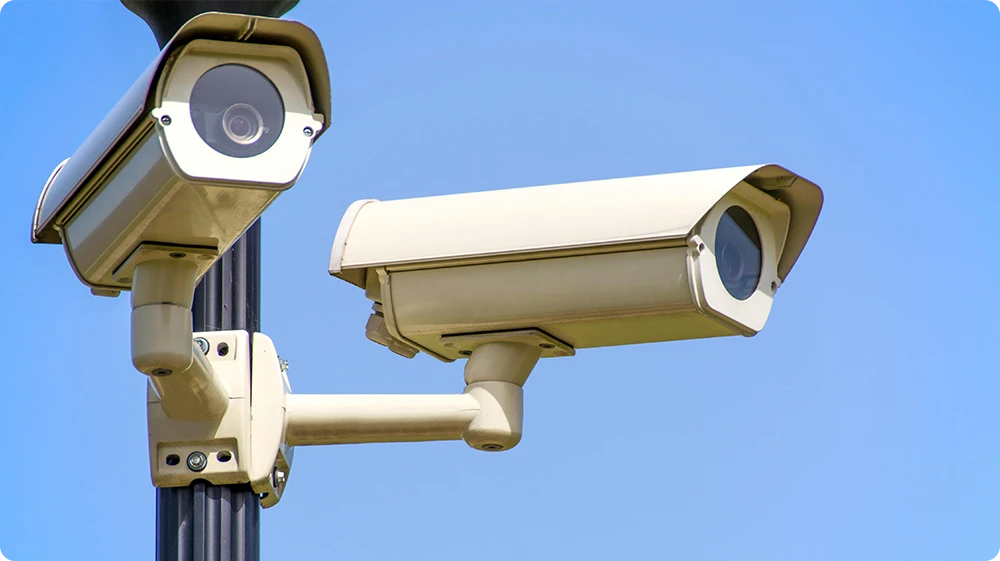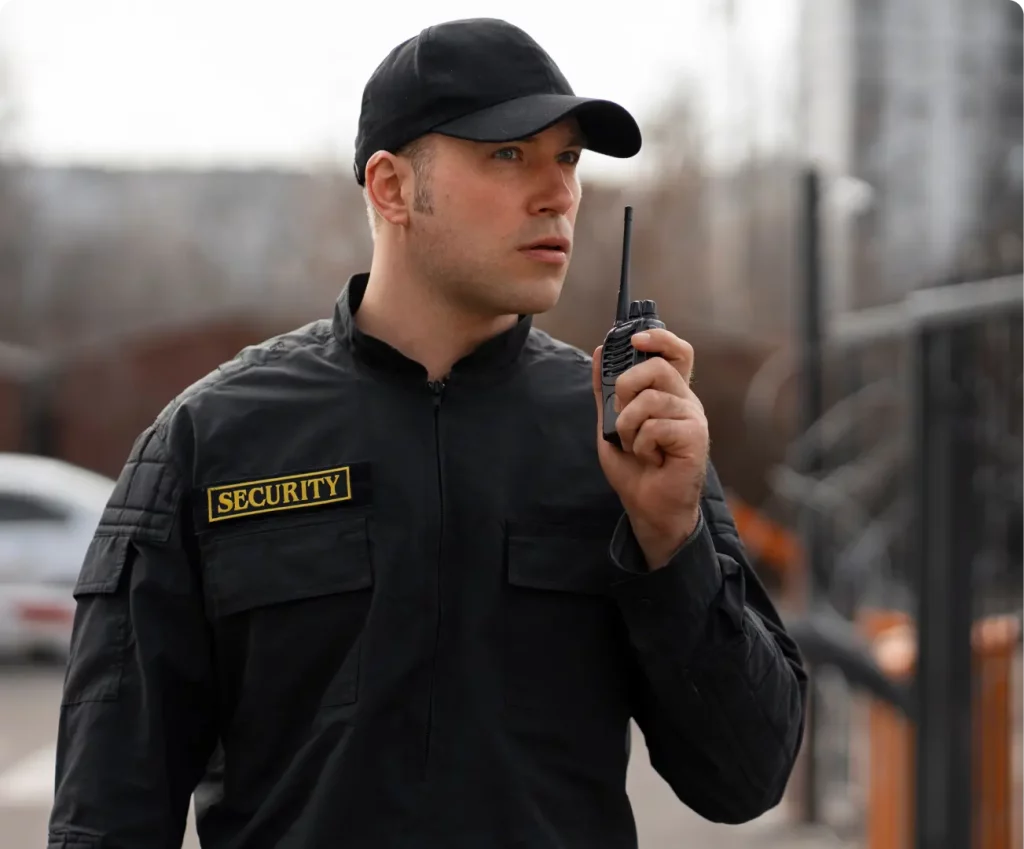CCTV cameras have become an essential part of our lives. They are commonly used to monitor activities and keep surveillance.
While most of us are familiar with how cameras capture video, it’s not always clear whether they also record sound.
Some CCTV systems are designed to capture both audio and video, but this is not a standard feature in all installations. Whether a camera can record sound depends on the model, the equipment used, and how it’s set up and installed.
CCTV cameras with audio capabilities also raise serious concerns about privacy and compliance with UK laws.
In this article, we’ll explain does CCTV have audio, can CCTV record sound, where they are commonly used, and what legal considerations you need to keep in mind before installing a CCTV audio system.
This is especially important for you if you manage a workplace with CCTV cameras that can record audio, or use them for your home security.
It’ll explain the legal restrictions in the UK regarding CCTV audio and help you stay compliant and avoid potential issues.

Does CCTV Have Audio?
CCTV cameras are primarily designed to capture video footage, but many question whether CCTV cameras have audio capabilities.
Some CCTV cameras do have an audio recorder, but the system is not installed in every model.
Can CCTV record sound? Well, it depends on the type of camera, whether it has a built-in mic or one added externally and how the system is set up.
Most basic or older cameras only record video. But newer ones, especially those used in retail or office environments, may have audio functionality.
In simple terms, do CCTV cameras have audio? Yes, they can, but only if the hardware supports it and the feature is enabled.
Similarly, does CCTV record sound? It depends entirely on whether microphones are present and if they have been configured correctly.
Some advanced systems even have two-way audio so you can talk to the operator and the person being monitored.
Also worth noting is that in some workplaces, employers choose not to turn on sound even when the camera can, due to privacy concerns and UK regulations.
Understanding these legal and ethical requirements is just as important as knowing what your equipment can do.
For security professionals and business owners, it’s important to know what your system can do and that it’s being used legally. Unauthorised recording or lack of proper signage can lead to legal action.
This also ties in closely with the standards of behaviour expected of security operatives, which focus on respecting privacy and acting within the law at all times.
Do CCTV Cameras Record Sound? How It Works
While CCTV systems are often thought of as just video recorders, some models are fully capable of recording both video and sound.
Modern systems can either include audio recording as an integrated feature or allow you to add it with external microphones.
Understanding how these setups work can help you make informed decisions while planning to install your system.
Types of Audio-Enabled CCTV
CCTV audio capability generally comes in two forms:
- Integrated audio: Many modern IP cameras come equipped with built-in microphones that automatically record sound along with video, eliminating the need for additional equipment or cabling.
- External microphones: Older systems or those requiring higher audio quality or coverage of a specific area may use a separate microphone.
These microphones are connected to the recording system, either directly into the camera or via the DVR/NVR. This allows for a more flexible placement of the camera, ideal for sound pickup.
Both options have their uses. Built-in microphones are easier to set up and maintain, while external microphones give you more control over placement and audio quality.
How Analogue and Digital Systems Handle Sound
Whatever you choose, whether it’s a built-in microphone or an external one, how the system processes the sound greatly depends on whether it’s an analogue or a digital system:
- In analogue CCTV systems, the camera sends a video signal to a recorder called a DVR (digital video recorder). If you also want to record sound, you usually need to use a separate cable from the microphone to the DVR. Each microphone occupies one slot, called an audio input, on the recorder, and most DVRs have a limited number of these slots. So, if you need sound from several cameras, you may quickly run out of available inputs.
- IP cameras (Internet Protocol) can send both video and sound through the same cable to the recorder, making them easier to use compared to analogue CCTV systems.
This makes the setup more organised and is one of the reasons why many businesses now prefer to use IP systems instead of the older analogue ones.
It is essential to understand the technological differences between analogue and digital systems if you are planning to upgrade your CCTV and wish to have a CCTV system with an audio component.
Does the Camera Placement Matter?
Before installing your camera, you must analyse where to place it to ensure clear audio and video quality.
Microphones, whether they’re internal or external, pick up both the intended sounds and the background noise, making the audio less transparent and more complicated to use.
For optimal results, install your CCTV in a quiet area with minimal background noise.
- Avoid installing near noisy machinery or vents.
- Place the microphone closer to where conversations or key activities happen.
- Use directional microphones if you need to focus on a particular area.
By planning the placement carefully, you can improve the audio clarity and quality.
It is legally permitted in the UK to install a CCTV camera with an audio recording system. However, there are specific legal requirements and restrictions you need to be aware of before setting one up.
If you are a CCTV operator who is SIA trained and hold a valid SIA licence, understanding the law and the potential legal consequences becomes even more critical.
To find out what UK law says about using CCTV cameras with audio recording, let’s take a closer look below.
Is It Legal for CCTV to Record Audio in the UK?
Installing a CCTV system with audio recording is legal in the UK; however, there are strict laws and guidelines governing its use.
Audio recording is treated differently from video surveillance because it’s more intrusive and can capture private conversations, compromising privacy.
Understanding these rules is essential, whether you’re installing CCTV at work, at home, or in a public place, to avoid breaking the law and facing penalties.
Legal Requirements for CCTV Audio Recording in the UK
There are three main laws and regulations you need to follow when using CCTV with audio in the UK:
GDPR and Data Retention
The General Data Protection Regulation (GDPR) gives people more control over how their data, including audio recordings, is collected, stored, and used.
If your CCTV system records sound, you must be able to justify why it is necessary, and you cannot collect more data than is reasonably required. GDPR also requires you to retain data only as long as it is essential for its purpose.
While UK law does not specify a fixed time limit, it is a common practice and recommended by the Information Commissioner’s Office (ICO) to delete CCTV recordings, including audio, within 30 days unless they are required for an investigation.
Keeping recordings longer than that without a valid reason is considered a breach of GDPR guidelines.
ISO Guidance on Audio Recording
Alongside UK laws, international standards such as ISO/IEC 27001 and ISO/IEC 27701 also provide guidance on managing and recording audio securely and responsibly.
These standards emphasise minimising the amount of personal data collected, protecting it with appropriate security measures, and ensuring transparency about how it is being used.
Following ISO guidance can help organisations demonstrate good practice and compliance.
Legal Considerations by Location
Workplaces
Employers may use CCTV with audio in workplaces if it is necessary, for example, for training, safety, or security purposes.
However, staff must be clearly informed that sound is being recorded. This can be done verbally during induction or by using clear, visible signs in the monitored areas.
Recording sound without informing the people involved is not only unacceptable legally but also potentially breaches both individual privacy and employment laws.
You are legally required to stop recording audio if anyone objects unless you have a strong, lawful reason to continue (such as during a formal investigation). You are also obligated to provide individuals with their audio recordings upon request.
Regularly monitoring staff without their knowledge or consent is likely to damage trust and lead to complaints or legal action.
Home Security
At home, you have more flexibility, but you still need to be mindful of privacy. You should avoid recording sound outside your property boundary, as your neighbours can object to this.
Even at home, it’s best to position microphones to only cover areas necessary for security purposes.
Suppose you have visitors — whether friends, family, contractors, or delivery personnel — you are responsible for making them aware that an audio recording is taking place. You can do this verbally when they arrive or by displaying a clear notice at the entrance.
Public Places
In public spaces, such as shopping centres or car parks, audio recording is rare and usually discouraged because it is much more intrusive than video alone.
If it is used, there must be an apparent, lawful reason, and signs must clearly warn people that the sound is being recorded.
Penalties for Breaking the Law
Failing to follow these laws can lead to serious consequences, including fines, legal action, or complaints to the Information Commissioner’s Office (ICO).
In some cases, evidence recorded unlawfully may also be inadmissible in court. This is particularly important for security professionals, as breaches could impact your ability to hold or renew an SIA licence, which is required to work in the private and retail security industry.
Where is CCTV with Audio Commonly Used?
Although CCTV audio recording is sensitive, there are some environments where it is more commonly used, usually where there is a clear, lawful purpose:
- Interview rooms or meeting rooms where consent is given in advance
- Cash handling areas or till points to help resolve disputes or investigate fraud
- Call centres or reception desks where customer interactions need to be recorded
- Specific high-security sites where communication is part of the monitoring
Even in these settings, CCTV audio should only be used when necessary, and people should be informed about it in advance.
Using CCTV with audio may have its benefits, but it also comes with added responsibilities.
You need to ensure that you inform people, either through verbal communication or clear signage, about the audio recording and respect their objections if they are not comfortable, and ask them to stop recording if they request it.
By following the GDPR and considering ISO guidance, and being transparent about your practices, you can use audio-enabled CCTV lawfully and responsibly, whether at work, at home, or in public.
Summary
CCTV camera is a very common device we use in our daily lives. We use it for home security, workplace safety and monitoring public spaces.
But many are not aware of its technological advancement and still wonder:
Do CCTV cameras have audio? The answer is yes, some do.
But it varies from model to model. Not all systems have audio, and even when they do, it’s important to use this feature responsibly, as there are legal restrictions in place.
In this article, we’ve explored how to use microphones to record sound in CCTV, the differences between analogue and digital setups, and the legal requirements for recording CCTV audio in the UK.
Informing people and respecting their privacy while recording a CCTV audio is legally advised and helps you maintain the trust of the people involved.
For those planning to join or already working in the security field, understanding these responsibilities is crucial, along with acquiring the right skills and knowledge from a recognised body for career enhancement.
Hurak’s security courses help you apply this knowledge confidently and lawfully in real-world situations.
Visit our site and enrol today!
FAQs
Do CCTV cameras have audio?
Yes, some CCTV cameras have audio capabilities, but not all models include this feature. Whether a camera records sound depends on its design, whether it has a built-in microphone or an external one, and how it is set up.
Does CCTV have audio as standard?
No, CCTV does not have audio as standard. Many older or budget systems record only video, while newer or more advanced systems may include audio features if enabled.
Does CCTV record sound in the UK?
CCTV can record sound in the UK, but strict laws govern its use. You must inform people through clear signs or verbal notices, avoid recording in private areas, and delete recordings when they are no longer needed.
Can CCTV record sound in workplaces?
Yes, CCTV can record sound in workplaces if it is justified — for example, for safety, training, or preventing disputes — but staff must be informed and their privacy respected.
How can I tell if a CCTV camera has audio?
Check for a small pinhole or grille on the camera where the microphone sits, review the camera’s specifications, or ask the installer. You may also notice audio options on the playback screen if sound is being recorded.
Is it legal to use CCTV with audio at home?
Yes, you can use CCTV with audio at home, but you should avoid recording beyond your property or capturing conversations with your neighbours. Visitors should also be informed that audio is being recorded.






